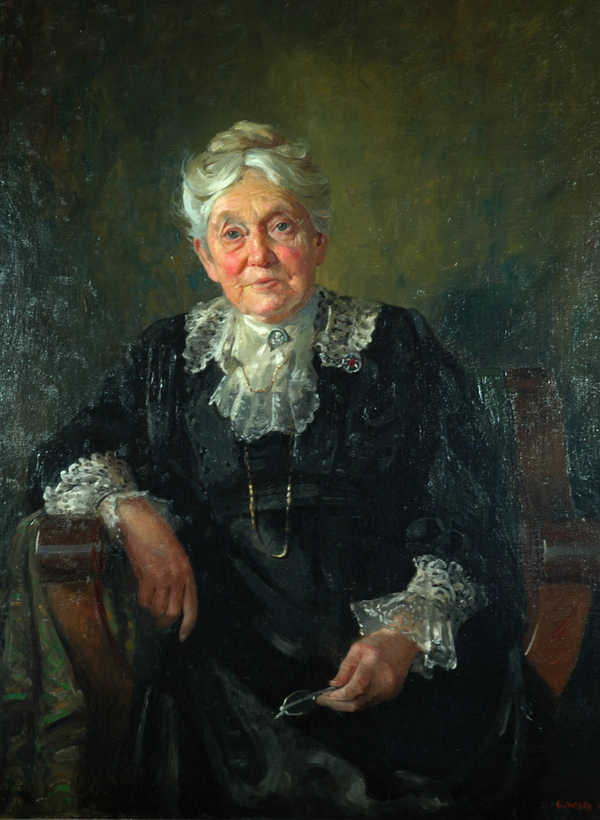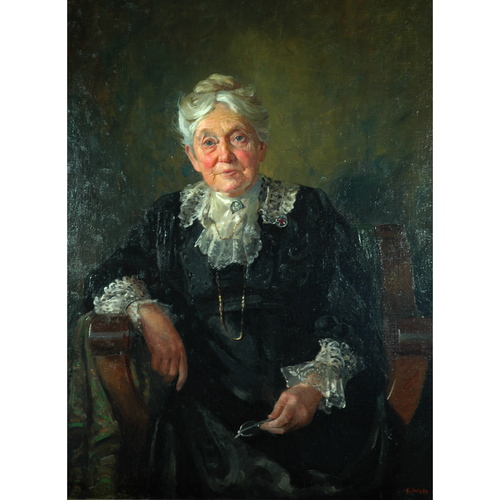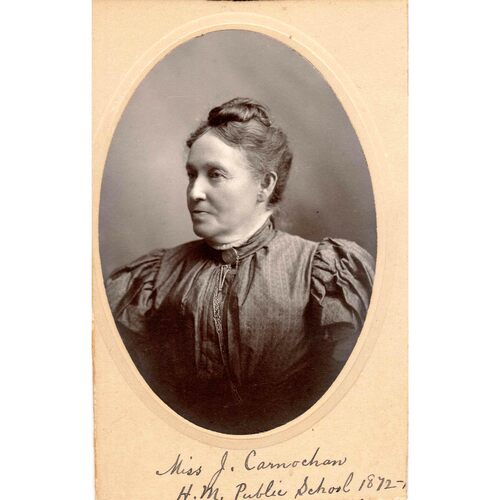
Source: Link
CARNOCHAN, JANET, educator and historian; b. 14 Nov. 1839 in Stamford (Niagara Falls), Upper Canada, second daughter of James Carnochan and Mary Milroy; d. unmarried 31 March 1926 in Niagara-on-the-Lake, Ont.
Janet Carnochan’s parents emigrated from Ayrshire, Scotland, to Stamford around 1830. Her father was a cabinetmaker and carpenter, an occupation that he continued to follow, first in Stamford and then, after the family’s move in 1841, in Niagara (Niagara-on-the-Lake). With her four siblings, Carnochan spent her childhood and adolescence in Niagara, where she attended the local schools and St Andrew’s Presbyterian Church. Like many young, single women in Upper Canada in the mid-19th century, she became a teacher by applying for a certificate of qualification in 1856. The following year, at age 17, she began teaching at the Niagara public school.
Carnochan pursued further qualifications in 1859 by attending the Toronto Normal School. She received a first-class provincial normal school certificate and went on to teach at Brantford Union School and then at Kingston’s Wellington Street public school. She remained at this school for five years, until her mother’s illness necessitated her return home to manage her parents’ household. After her mother recovered, Carnochan taught for a year in a rural school near Peterborough. But when the principal’s position at the Niagara public school became vacant, she applied for the job and, upon being accepted, returned home in 1872. Few sources document her years as a public school principal, but tributes later stressed her dedication to teaching and the esteem in which she was held. Two years after a new high school building in Niagara was completed in 1876, Carnochan joined its staff, and she remained there until her retirement in December 1900.
While teaching school, Janet Carnochan also channelled considerable energy into travel and voluntary work. She turned her experience of being shipwrecked off Sable Island, N.S., while en route to Britain in 1879 into a narrative that appeared in the Canadian Methodist Magazine (Toronto and Halifax) three years later. After her return to Niagara in 1872, she had become active in St Andrew’s Church, teaching in its Sunday school and helping to raise funds for the church. She also sat on the board of managers from 1892 to 1895 and was secretary of the women’s missionary society from 1887 until her death in 1926. In addition to her church work, Carnochan served on the board of the Niagara Public Library as secretary and treasurer and from time to time as temporary librarian. In 1893 she was chosen as one of 20 Canadian women to attend the World’s Congress of Representative Women in Chicago.
Though schoolteaching occupied more than 40 years of Janet Carnochan’s life, it is her informal educational work as a local and regional historian, historical preservationist, and museum director that is remembered today. She began making forays into historical writing in the 1890s with accounts of Niagara’s Anglican and Presbyterian churches, and throughout the rest of her life she continued to contribute articles and deliver papers on historical subjects. She even wrote poetry on such patriotic themes as “Has Canada a history?” In 1895 Carnochan became the president of the newly established Niagara Historical Society, which she had helped to found (an earlier endeavour by Niagara resident and historian William Kirby* had been short-lived). She would be a leading figure in the society until 1925, serving as president, corresponding secretary, and editor of its reports and publications.
After her retirement from teaching in 1900, Carnochan was even more involved in historical activities. She became curator of the NHS’s collections in 1901 and spearheaded its drive for the construction of Memorial Hall. Opened in 1907, it was the first building erected as a museum in Ontario. She also represented the society at the annual meetings of the Ontario Historical Society. From 1901 to 1911 she sat on the monuments committee of the OHS, and from 1914 to 1919 she was that society’s vice-president. In addition to her activities with these organizations, Carnochan wrote a historical column in the local paper, the Niagara Times. Her History of Niagara . . . , printed by William Briggs in Toronto, appeared in 1914, with a foreword by Arthur Hugh Urquhart Colquhoun*, deputy minister of education for Ontario, who praised it as “an example of elaborate and untiring investigation.” Carnochan also expended much energy in attempts to preserve historical landmarks in Niagara, such as Butler’s Burying Ground, forts George and Mississauga, and the military reserve, or commons.
Janet Carnochan was certainly not unusual in her historical activities; her work must be placed within the larger context of provincial, national, and international movements to preserve and commemorate the past. She was a frequent correspondent with other like-minded individuals and organizations, such as the OHS’s secretary and provincial archaeologist David Boyle* and the Women’s Canadian Historical Society of Toronto [see Sara Mickle]. Like them, she was steadfast in her support of English-Canadian nationalism and believed in the importance of the country’s ties to Britain and its membership in the empire. But unlike other imperialists active in the historical movement, such as Clementina Fessenden [Trenholme*], Carnochan was fairly liberal in her political outlook. She wrote sympathetically about the travails of transported reformer Benjamin Wait* following the rebellion of 1837–38 and portrayed his wife, Maria Smith, as a heroine for her attempts to win his pardon. She depicted the Niagara area as a refuge for fugitive slaves, partly in order to remind her contemporaries of the historical and ongoing significance of such British values as anti-slavery. There is no record of her public support for women’s suffrage, but she was enthusiastic about attempts to memorialize Canadian women such as Laura Secord [Ingersoll*] and maintained that women’s work in building the Canadian nation must be recognized by historians.
Carnochan believed that historical narratives played a critically important role in creating national identity, but she also was genuinely fascinated by the past and was passionately devoted to historical investigation. Unlike that of some of her contemporaries, her work was based on extensive research in written and material sources. Both during and after her lifetime, Janet Carnochan received a number of local, provincial, and national tributes to her endeavours, including having a Toronto teachers’ chapter of the Imperial Order Daughters of the Empire named in her honour.
In addition to the works mentioned in the text, Janet Carnochan is the author of Shipwrecked on Sable Island, ed. J. L. Field (St Catharines, Ont., 1986).
AO, F 1138, ser.F-I, minutes, 1895–1952; F 1139-3, MU 5422-29; F 1139-4, 1898-1925, MU 5440. Brock Univ. Library, Special Coll. and Arch. (St Catharines), RG 9 (Joseph Edward Masters fonds), Janet Carnochan. Niagara Hist. Soc. Museum (Niagara-on-the-Lake, Ont.), Carnochan coll. Canadian men and women of the time (Morgan; 1898 and 1912). C. M. Coates and Cecilia Morgan, Heroines and history: representations of Madeleine de Verchères and Laura Secord (Toronto, 2002). J. L. Field, Janet Carnochan (Markham, Ont., 1985). Gerald Killan, Preserving Ontario’s heritage: a history of the Ontario Historical Society (Ottawa, 1976). Cecilia Morgan, “History, nation, and empire: gender and southern Ontario historical societies, 1890–1920s,” CHR, 82 (2001): 491–528. F. D. Smith, “Miss Janet Carnochan: a sketch and an appreciation,” Canadian Magazine, 38 (1912): 293–97.
Cite This Article
Cecilia Morgan, “CARNOCHAN, JANET,” in Dictionary of Canadian Biography, vol. 15, University of Toronto/Université Laval, 2003–, accessed April 24, 2025, https://www.biographi.ca/en/bio/carnochan_janet_15E.html.
The citation above shows the format for footnotes and endnotes according to the Chicago manual of style (16th edition). Information to be used in other citation formats:
| Permalink: | https://www.biographi.ca/en/bio/carnochan_janet_15E.html |
| Author of Article: | Cecilia Morgan |
| Title of Article: | CARNOCHAN, JANET |
| Publication Name: | Dictionary of Canadian Biography, vol. 15 |
| Publisher: | University of Toronto/Université Laval |
| Year of revision: | 2005 |
| Access Date: | April 24, 2025 |




